The global classroom: Princeton journalism class reports from Berlin on refugees and forced migration
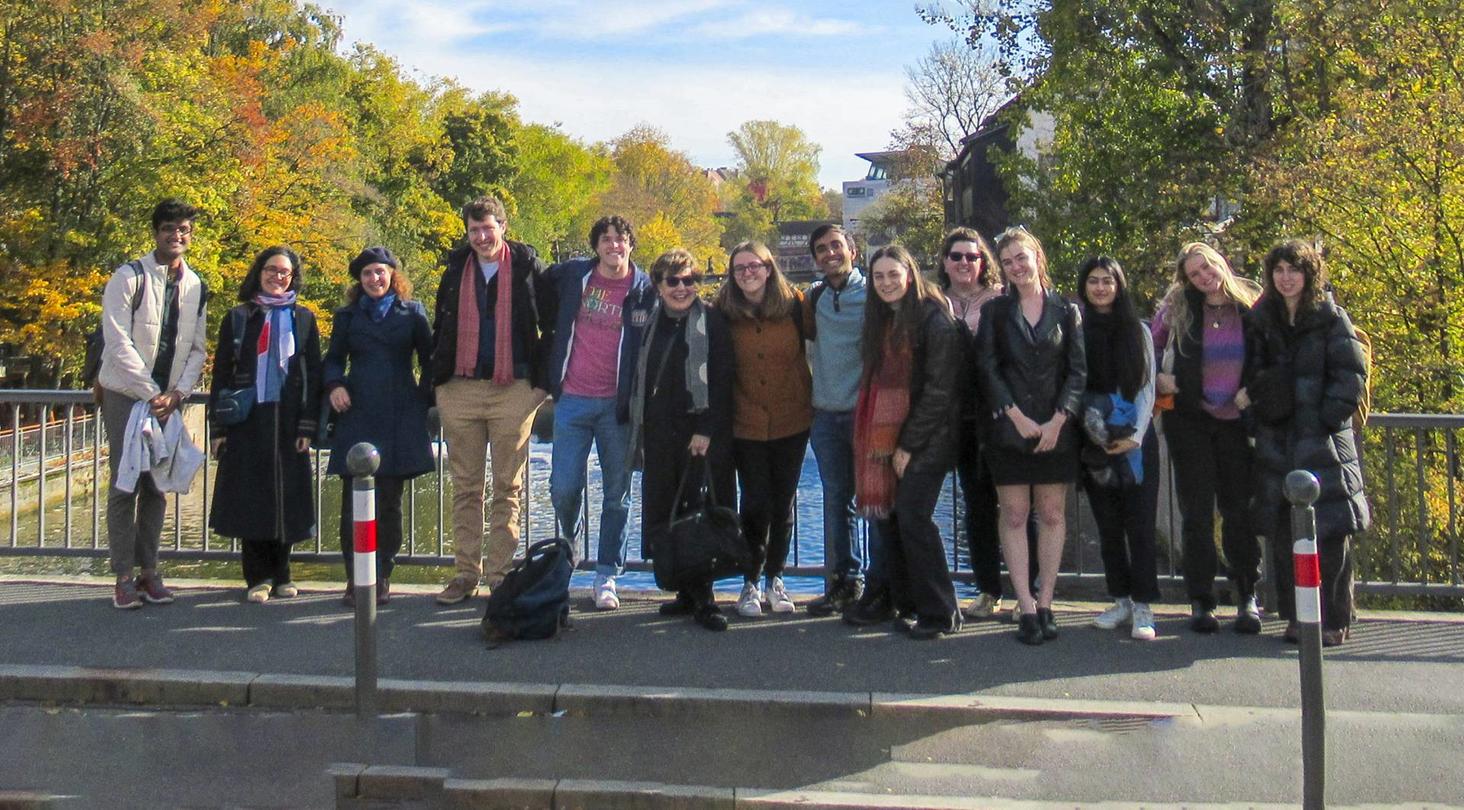
“Forced migration has now topped 100 million people across the globe,” says NPR correspondent Deborah Amos, a Ferris Professor of Journalism in Residence at Princeton. “It is one thing to read that number, it is quite another to interview one victim and understand the enormity of the number.”
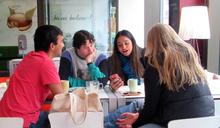
Eleven Princeton students in Amos’ journalism course “International News: Migration Reporting” had that experience during a fall break trip to Berlin this October. Already home for decades to Turkish, Lebanese, Palestinian, Iranian and Afghan refugees and migrants, Berlin has more recently become a haven for Syrians and now Ukrainians fleeing their war-torn countries. Each day the students set out all across the city, notebooks and recorders in hand — to the Central Train Station where Ukrainian refugees continue to arrive at all hours, to the Afghan embassy where government officials and diplomats are focused on the crushing crisis of Taliban rule, to restaurants where migrants have secured work in their temporary homeland — to learn and practice field reporting for their final project: a 2,500-word article about an immigration or human rights topic. Learning to observe history in the making as news correspondents, the Princeton students progressed in a week’s time from interviewing pre-arranged sources to finding their own amid the tumult of a city at the crossroads of the forced-migration crisis. “I was astonished by the generosity of the people who were interviewed — sometimes for hours, by student journalists,” Amos said. “They wanted to tell their stories, even the parts that were difficult and painful.” The Program in Journalism is housed in Princeton’s Humanities Council.
At the Central Train Station: ‘What happens when they arrive?’
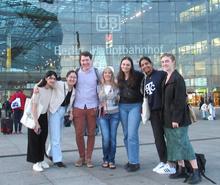
The Berlin Hauptbahnhof (Central Train Station) is a soaring contemporary glass and steel building that serves as a key transit nexus between eastern and western Europe, handling about 1,800 trains a day. Hanging high above all the stations five levels is an immense #StandWithUkraine banner made of interconnected yellow and blue tiles. Zara Raimbek, a native of Kazakhstan who speaks Russian, volunteers with a group called Berlin Arrival Support at the train station, greeting Ukrainians, many of whom come to Berlin via Warsaw. A young film student studying in Berlin, she befriended Amos last spring and during the fall break trip helped connect the Princeton students with Ukrainians she knows. Over dinner at a restaurant adjacent to the train station on their second day on assignment, the student reporters met some of Raimbek’s fellow volunteers — Ukrainians, Russians, Syrians, Berlin natives and U.S. ex-pats. Sitting in small groups, they peppered the volunteers with questions.
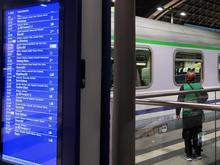
One student wanted to know: “What happens when they arrive?” “We help them off the train with their luggage, answer questions, ask if they have plans,” said Ali Alhwat, who left his native Syria in 2018. Another student asked, “What inspired you to volunteer?”
“Why would I not volunteer? They are fleeing from the war and I feel for them,” said Alhwat, who was a refugee himself. Sophomore Patrick Newcombe, an ecology and evolutionary biology concentrator, spent the afternoon at the station shadowing a volunteer then returned after the dinner to watch the Berlin Arrival Support meet the last train of the night from Warsaw: the 10:16 p.m. Two green-vested volunteers greeted the day’s final arrivals from Ukraine: a group of five adults pulling huge suitcases and accompanied by a large dog. The volunteers spoke to them gently in Ukrainian, their arms wide open, forming a circle to protect them from the bustle as they made their way down the platform. “Since February, I have been glued to news about Russia’s invasion of Ukraine,” Newcombe said. “Spending time at the Berlin Hauptbahnhof put faces to my understanding of the humanitarian consequences of the war. Seeing the victims of war arriving at the central train station firsthand made the gravity of working towards a more peaceful, more democratic world even clearer in my mind.”
At the Berlin Mosque: ‘What was the moment you felt you had to leave?’
The two cream-colored minarets and brilliant silver dome of the the Berlin Mosque, the oldest mosque in Germany, pierce the sky high above the well-to-do residential Wilmersdorf neighborhood in south Berlin. The mosque, also known as Ahmadiyya Mosque, is one of six in Berlin that Fizzah Arshad, a junior and history concentrator, visited for her project on Muslim refugees and their relationship with their faith.
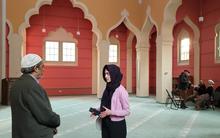
“Being in a city with such a visible and well-preserved history put the present in conversation with the past,” she said. Ahmadiyya’s imam, Amir Aziz, greeted her warmly and invited his assistant, Ghaleb Alali, to join them. Alali, a former teacher in Damascus, had fled the war in Syria in 2015. Arshad asked: “What was the moment you felt you had to leave?” He pulled up his shirt to reveal a fabric brace wrapped around his belly, which he must wear all the time, and said he had been shot while walking to school, caught in the crossfire of an army skirmish. “The trip made Berlin our classroom,” Arshad said, not only for the essentials of reporting the news but also for the extraordinary depth of human experience. Alali had also lost his son in the war. He arrived in Berlin after traveling with about 35 family members and friends by foot, bus, bicycle and car through several countries. At the mosque, helping the imam and teaching again, he had found new purpose and community. “I hadn’t realized it was possible to retain one’s optimism and capacity for joy in the way that he does, after enduring such adversity,” Arshad said. Waiting tables, waiting to return home Junior Abigail Goldberg-Zelizer, a history concentrator whose final project focuses on the different experiences of Ukrainian refugees, arranged to interview an art history student from Kyiv who’d found work through Facebook at a restaurant in Mitte, Berlin’s lively central district.
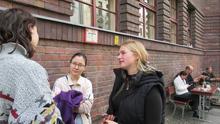
Junior Abigail Goldberg-Zelizer (in black vest) interviews an art history student from Kyiv (left) who’d found work at a restaurant in Berlin, as Zara Raimbek, a film student in Berlin who speaks Ukrainian and Russian and assisted with many of the students’ interviews, looks on. Photo byJamie Saxon, Office of Communications “Germany created an infrastructure for Ukrainians in a way that it hasn’t for any other refugee group, from paying for their transportation to come to Berlin, to giving them work visas, to helping them find housing,” the Princeton student said. “Some refugees feel very grateful for Berlin, for Germany, for taking them in and … they have been able to find work and a community. Other refugees have struggled with finding work with the language barriers and have felt extremely isolated.” To break the ice with Anna Berson, the young woman from Kyiv, Goldberg-Zelizer asked what she had brought with her when she left home. Nothing but her art history and history books, she said. “I’m also a history student!” Goldberg-Zelizer said. “Who’s your favorite Ukrainian artist?” Later, as the two had developed a warm rapport, Berson spoke of her life in Ukraine during the Russian invasion, where the screaming sirens in Kyiv warning people to move into shelters were incessant. She confided to Goldberg-Zelizer that she frequently calls her grandmother in her hometown of Zaporizhzhia, 445 kilometers from Kyiv, “to make sure she’s still alive.” She yearns to return home. Goldberg-Zelizer is considering a career in journalism and said the Berlin trip captured the critical work of reporting on the ground. “I’ve learned how important the human element of journalism is. Being able to physically connect with the person that you’re talking to, especially if that person is a refugee and they’re sharing very traumatic and emotional stories, is very important.”
Reporting on the ground: ‘There is no substitute’
“You have to be in the field to understand why this profession is so compelling,” Amos said. “These break trips get to the heart of the matter — give students the ‘experience’ of journalism. There is no substitute for it.”
She developed the idea for the course during a six-month fellowship earlier this year at the American Academy in Berlin.
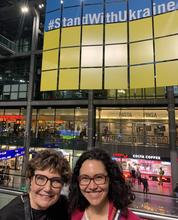
“Just a few weeks after I arrived, Russian troops crossed the border into Ukraine — and Berlin felt like a front-line state,” said Amos. “Within days, Ukrainian refugees began to arrive at Berlin’s central station — I could hear the invasion — hear the Ukrainian speakers in a train station that was part of my daily routine.”
Her project at the Academy was to document Syrian war crimes — Germany’s national courts are increasingly seen as a place to seek justice. By May, she realized she “had enough contacts to help students craft stories and help them find sources, experts, refugees, torture survivors, to make a fall break trip possible.”
Critical to the planning, Amos said, was Delphine Lourtau, a human rights lawyer she met in Berlin. (Lourtau speaks German, Amos does not.) At restaurants and museums, on walking tours and in their offices, scholars, lawyers, artists and journalists discussed with the students their work focused on forced migration, and on gathering and verifying evidence — including eyewitness testimonials and citizen-generated data such as social media posts and video — that they hope will help build cases documenting war crimes, including those being committed in Ukraine.
Navigating the unexpected at an embassy, a street protest, and beyond
Princeton faculty helped some students identify sources in Berlin before the trip — but the students learned on the ground how often journalists must navigate the unexpected.
Early one morning, senior Kanishkh Kanodia, a concentrator in the School of Public and International Affairs (SPIA), stood outside the gates of Germany’s Afghan embassy. He had no appointment — just the echoes of a conversation he’d had on campus with Arian Sharifi, an associate research scholar and lecturer in SPIA and a former Afghan government official.
When the guard asked Kanodia at whose reference he was there, Kanodia called Sharifi at Princeton. Remarkably, Sharifi picked up and spoke to the guard. Kanodia was able to interview a senior official off-the-record for two hours. He was amazed. “That was literally the first in-person interview I have ever done!”
On assignment day three, Kanodia and sophomore Laura Robertson took a morning train to Hamburg, two hours outside Berlin: Robertson had some leads: an Iranian protest and a theater director who heads up a community organization to help refugees. Kanodia had an interview lined up with Fahim Fetrat, a prominent Afghan journalist who left Kabul for Hamburg in 2021.
At the protest, held in response to the death of Mahsa Amini in Iran, a protestor named Kamyar Saadet who had fled Iran two years ago told them: “When [Amini’s death] happened, we were so shocked, so angry. We had to do something here in Germany too. When you are out of your country, all you think of is your motherland.” Robertson, who studies Persian at Princeton, asked questions in English and Persian, and learned about a huge protest a few days later in Berlin.
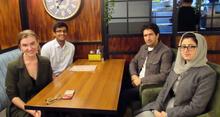
Later, in a diner in Hamburg’s Little Kabul neighborhood, Kanodia studied his notes as he prepared to interview Fetrat. The two had connected through another Princeton faculty member, Wahid Wafa, who worked in The New York Times bureau in Kabul for more than a decade and joined the University in January as a professional specialist with the Program in Journalism and the Humanities Council. Fetrat, a former political adviser to the Speaker of Afghanistan Parliament, arrived with Parwana Ibrahimkhil, a 23-year-old Kabul native whose capture and imprisonment by the Taliban after attending an anti-Taliban protest made headlines in January. She has found safe haven in Stuttgart. Kanodia was astonished that she had agreed to come speak with him — Stuttgart is a seven-hour train ride from Hamburg.
Fetrat quickly offered to translate; the interview lasted two hours.
Kanodia asked Amos why people would talk to them. “We are just undergrads and have nothing to contribute to their lives. She told me that if you appear genuine, they will want to share their story, because they also find relief in that. Interviewing skills is what distinguishes a good journalist from a great one.”
Senior Rohan Jinturkar, a computer science concentrator and first-time journalist, experienced that same surprise. He cold e-mailed Anwar Al-Bunni — a prominent Syrian human rights lawyer who was key to the prosecution in the first Syrian war crime trial, which was held in Koblenz, Germany, and ended Jan. 17 with a guilty verdict — asking for an interview. Al-Bunni, who was imprisoned and tortured by the regime of Bashar al-Assad before migrating in 2014 to Berlin, where he founded the Syrian Center for Legal Studies and Research, said yes.
“He has made it his life’s work to hold Syrian government officials accountable,” said Jinturkar, who also interviewed other Syrian refugees in Berlin. “No in-class experience could replicate those moments.”
More Princeton courses and initiatives exploring migration:
- The Global History Lab, a virtual course, brings together learners around the world who study the war in Ukraine, the Taliban’s recent takeover of Afghanistan and mass displacement in East Africa from people who have experienced those events firsthand.
- The graduate seminar “Policy Workshop: Implementing Refugee Policies,” taught by Filiz Garip, professor of sociology and public affairs, traveled to three cities in Turkey over fall break — İstanbul, Ankara and Eskişehir — where they worked with the Association for Solidarity with Asylum Seekers and Migrants.
- The Religion & Forced Migration Initiative, a program of the Office of Religious Life, explores the role religion plays in the U.S .refugee resettlement system. Since 2018, over 200 undergraduates have been conducting and transcribing oral history interviews with refugees, developing learning materials and interning at resettlement agencies.
